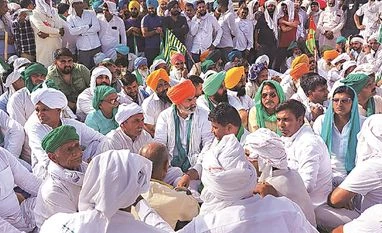A few days ago, sunflower farmers in Haryana were agitating for the minimum support price (MSP), as market rates slumped in recent months.
The MSP for sunflower seeds for the 2022-23 season was Rs 6,400 per quintal (raised to Rs 6,760 for the 2023-24 season), but the price the farmers got was just Rs 4,000-5,000.
The state government was willing to give an interim relief of around Rs 1,000 per quintal under the Bhawantar Bharpai Yojana (Haryana is among the very few states that have a system of price-deficiency payment for some crops), but the farmers wanted full procurement at the MSP of Rs 6,400.
After several rounds of discussion and even acrimonious scenes, with farmers blocking the Delhi-Chandigarh highway, the protest was called off following the state government’s assurance that an “appropriate” price would be paid.
Although reports said farmers were not clear about what that “appropriate” price would be, leaders like Rakesh Tikait said they would get the rate set by the Centre.
In the meanwhile, the Haryana government released Rs 29.13 crore as interim compensation to 8,528 farmers for sunflowers grown on 36,414 acres.
With Haryana going to the polls in 18 months, no political party can take the risk of antagonising the peasant class, which forms a significant chunk of the state’s electorate.
The Congress, which is in the Opposition, has castigated the Haryana government for showing its “anti-farmer face” during the protests after a police assault.
Ram Charan Kala, Shahbad MLA of the Jananayak Janata Party (a BJP ally), who was chairman of the cooperative body Haryana Sugarfed, resigned in protest against the government’s treatment of the sunflower seed issue.
The wrangling over the “appropriate” price has brought into the foreground the complexities surrounding the MSP mechanism and its administration.
Interestingly, while farmers were agitating a few km from Delhi, the Central government announced a big hike in the MSPs of some kharif crops. But more than the hikes, it is the administration of MSPs that remains a thorny matter.
Though the number of farmers selling their produce at the MSP has seen an exponential rise in the last few years — the surge in pulses procurement and the impact it has had on production is a prime example of this — when it comes to crops such as oilseeds, MSP intervention remains inadequate at times.
The Commission for Agriculture Costs and Prices (CACP), in its latest report on kharif 2023, said pulses procurement reached a record high of 4.2 million tonnes in 2018-19, registering an increase of almost 112.2 per cent over the previous year.
During the kharif marketing season of 2022-23, till March 14, around 2.8 million tonnes were procured under various schemes. This number has now swelled to almost 3.8 million tonnes.
For oilseeds, the same report said procurement increased from 1.62 million tonnes in 2018-19 to 1.82 million tonnes in 2019-20. Thereafter, it started declining and reached 1.1 million tonnes in 2021-22 due to improvement in prices.
During 2022-23, till March 14 around 500,000 tonnes had been procured by various agencies.
Here too, the procured quantity is expected to go up because procurement is a continuous process.
However, for oilseeds the Commission has a word of advice. It said procurement was generally done by public agencies and subsequently sold in the open market.
“It creates a disincentive for private players to procure directly from farmers,” the report said.
To prevent this, the CACP strongly advocated the Price Deficiency Payment Scheme (PDPS) and Private Procurement and Stockist Scheme (PPPS) of the government instead of direct procurement.
It is here that the much-talked-about PM-ASHA (Pradhan Mantri Annadata Aay Sanrakshan Abhiyan) of the Central government and what it can do to provide remunerative prices to farmers come into play. PM-ASHA has a few components: They are the Price Support Scheme for pulses, oilseeds, copra, etc; the PDPS for oilseeds; and the pilot of the PPSS for oilseeds.
However, the CACP came down heavily on PM-ASHA, saying it had not been very encouraging because states did not show much interest in it. Even the Union budgetary allocation for PM-ASHA has been reduced from Rs 1,500 crore in 2019-20 to only Rs 1 lakh (budgetary estimate in 2023-24).
“There is a need to review the PM-ASHA Scheme,” the CACP said in its recommendations.
Sudhir Panwar, professor at the University of Lucknow and an expert on farm issues, said the concept of MSP would not be realised without adequate procurement.
It has been seen the government wants to gradually withdraw itself from administering the MSP, which will leave farmers at the hands of the market, he said.
Unlock 30+ premium stories daily hand-picked by our editors, across devices on browser and app.
Pick your 5 favourite companies, get a daily email with all news updates on them.
Full access to our intuitive epaper - clip, save, share articles from any device; newspaper archives from 2006.
Preferential invites to Business Standard events.
Curated newsletters on markets, personal finance, policy & politics, start-ups, technology, and more.
)